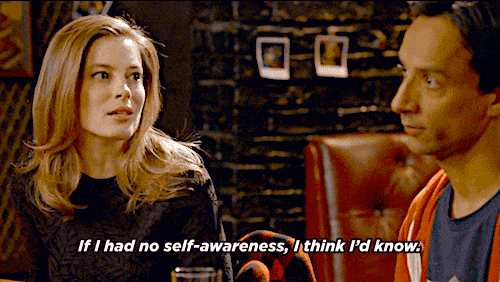So you’ve heard of IQ, but what about its lesser-known cousin, EQ? There’s not a MENSA or a reliable test for “emotional quotient,” but this unique intelligence can be far more important when it comes to social interaction.
What is Emotional Intelligence?
Emotional intelligence (EI), sometimes called EQ, can be loosely defined as “the ability to identify and manage one’s own emotions and the emotions of others.” (source)
The Emotional Quotient Inventory breaks EI down as follows:
- Self-Perception: Understanding and awareness of your own emotions
- Self-Expression: Expressing your emotions
- Interpersonal: Developing and maintaining relationships
- Decision Making: Using emotions to make better decisions
- Stress Management: Coping with stress and other challenges (source)

Leslie Knope is not nailing the “self-perception” side of things here…
What can EI help you achieve?
Emotional intelligence is critical when it comes to navigating emotions, both our own and others’. Developing your EI can help you:
- Recognize your own emotions
- “Why am I so disinterested in going out? I usually love socializing! Then again, I’ve been feeling so downtrodden at work lately… that must be what’s wearing me down.”
- Identify the root cause behind your feelings
- “Why can’t I just be happy for them? I guess I wish I had what they have.”
- Communicate effectively when you’re feeling emotional
- “I’m so frustrated, but giving him the cold shoulder isn’t the best way for him to understand why. I should just explain how I’m feeling.”
- Recognize others’ feelings
- “Why does Drew keep ignoring me in the hallway? Oh, he has that huge deadline coming up, he’s probably preoccupied with the project.”
- Respond appropriately to others
- “I was hurt by Nicole’s tone just then, but I know her mother is in hospital. That must be putting her on edge; I’ll respond calmly instead of snapping back.”
Developing your Emotional Intelligence
As you can see, EI can help you navigate conflict in your workplace, friendships, and relationships. But how can you develop this critical intelligence?
- Check in with yourself at regular intervals throughout the day
- “How am I feeling right now? Why might I be feeling that way?”
- Start naming your emotions
- Instead of thinking “I’m angry today”, take it a step further. “I feel overlooked, hurt, and frustrated.”
- Question your assumptions
- “Mark just answered me with one word. He came across as frosty. However, maybe he’s swamped with work right now and isn’t thinking about pleasantries.”
- Consider the context
- “Wow, Raquel’s criticism made me feel terrible about myself. But stepping on the scale this morning lowered my self esteem so much. If I wasn’t already feeling bad, I’d probably view her critique as helpful.”
- Regulate your responses
- “I’m so annoyed with how this was handled, and that’s understandable. However, if I want to change the protocol, I can wait a while. I’ll bring it up again when I can express myself calmly.”

This may be your current level of EI, but now you’re aware of it, you can improve!
These things are easier said than done. For example, when we’re feeling threatened, it’s hard for us to recognize that we’re being unusually defensive. However, with time and practice, you can implement some of the above tips to increase your emotional awareness.

